Best Electric Guitar Strings 2025: Freshen Up Your Sound
Get your guitar playing to its potential with our pick of the best electric strings for all styles and budgets
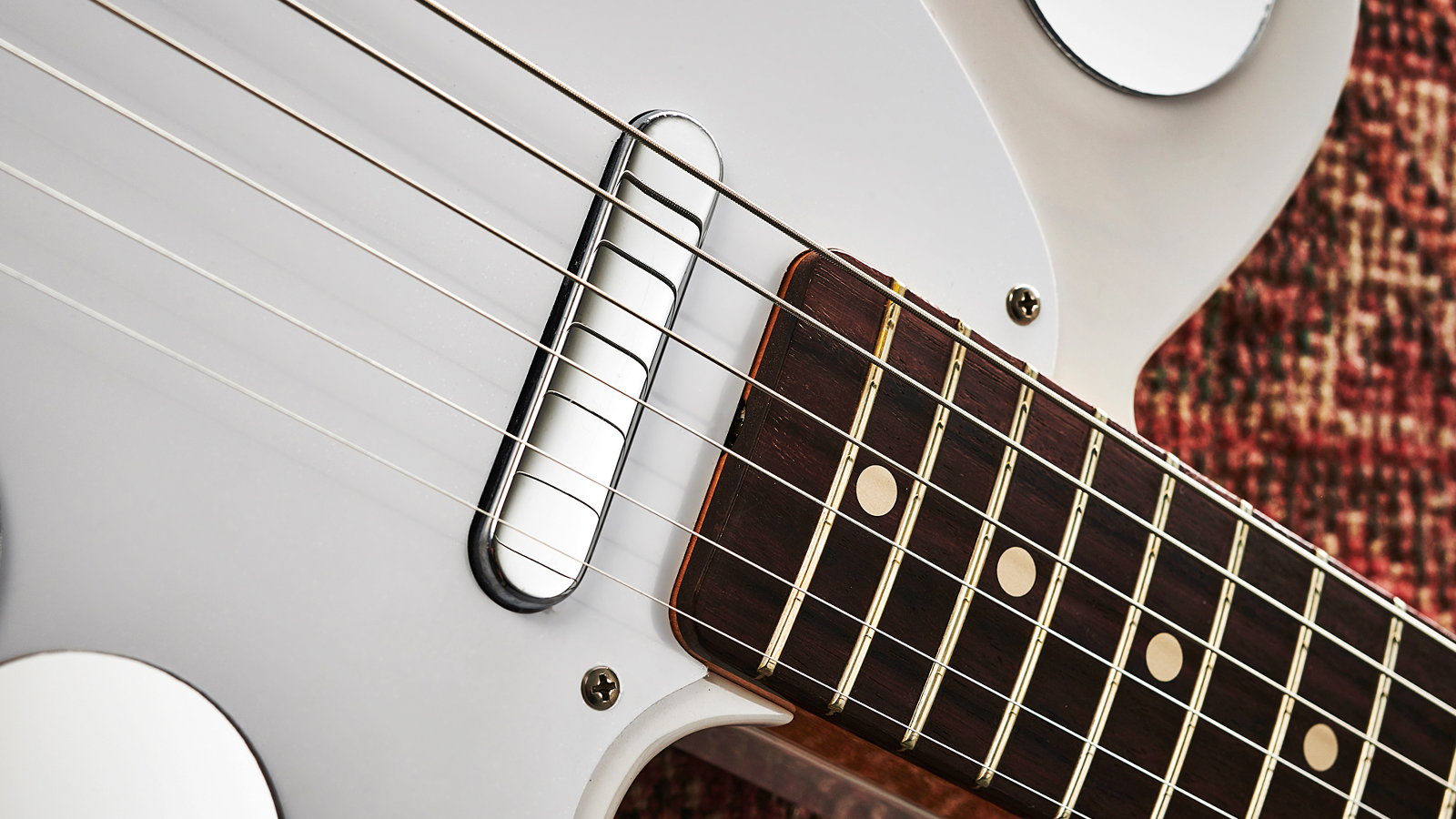
Choosing which of the best electric guitar strings to equip your instrument with may not be something you consider all that deeply. Restringing your guitar is more of a chore than anything else, right?
While restringing your guitar may be something that gets put off, the difference a fresh set of strings makes is palpable. Not only does it bring back brightness to your sound, but it also improves the feel of the instrument too. Choosing a different set of strings may not just refresh and reinvigorate your instrument – it may totally transform it, with different metals, gauges, and coatings all offering something unique that may better suit your playing style.
And if you’re unsure about which kind of string is best for you – perhaps you’ve fallen into buying the cheapest strings or have just followed what a guitar tutor or friend uses – this list will give you the knowledge to make your own decision on the best electric guitar strings for your playing style.
Best electric guitar strings: Product guide
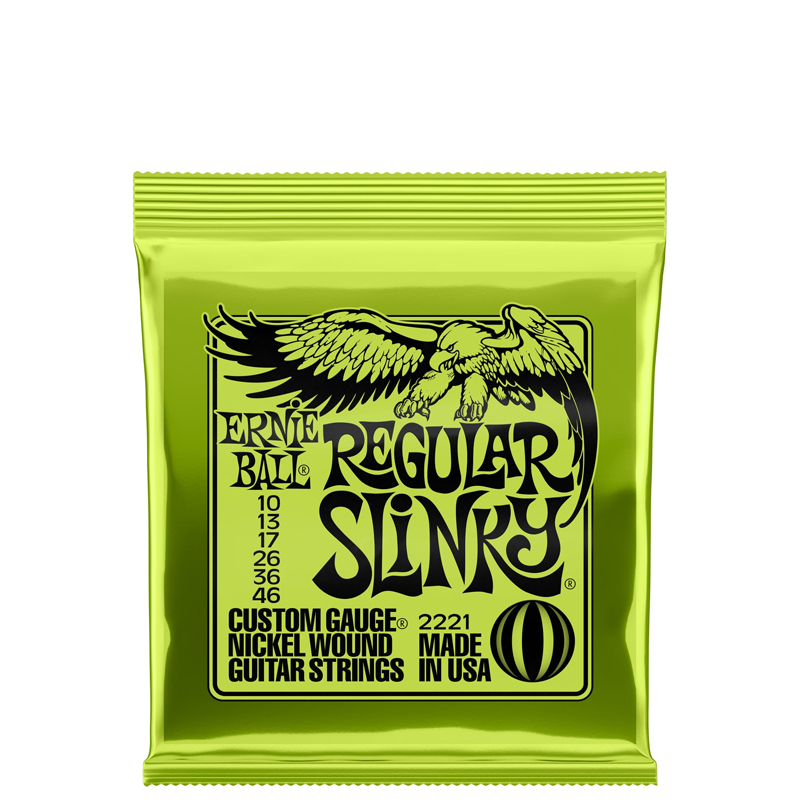
Spec: Nickel wound with steel core, uncoated
+ Huge selection of gauges
+ The choice of many pros
- Not as long-lasting as coated strings
Ernie Ball has been making strings since the ’60s and its list of endorsees reads like a who’s who of rock and blues history. Combining a huge range of gauges with outstanding tonal qualities makes these the top dog of electric guitar strings.
There are a whopping 20 different gauges of Ernie Ball Slinkys, and that’s not including baritone and extended range sets. With the recent addition of ‘half-gauge’ sets beefing up the range significantly, Ernie Ball now offers a gauge to suit pretty much any guitar player. Being such stalwarts, you’ll never struggle to find a packet of Slinkys in a guitar store, no matter how provincial the town your gig is in this weekend.
The sound of these strings is the sound of countless hit songs over the decades, combining a bright tonality that delivers consistently, at a price point that’s hard for others to match. When you’ve got Jimmy Page, Eric Clapton, Slash and Keith Richards on the pack, there’s little reason to look elsewhere.
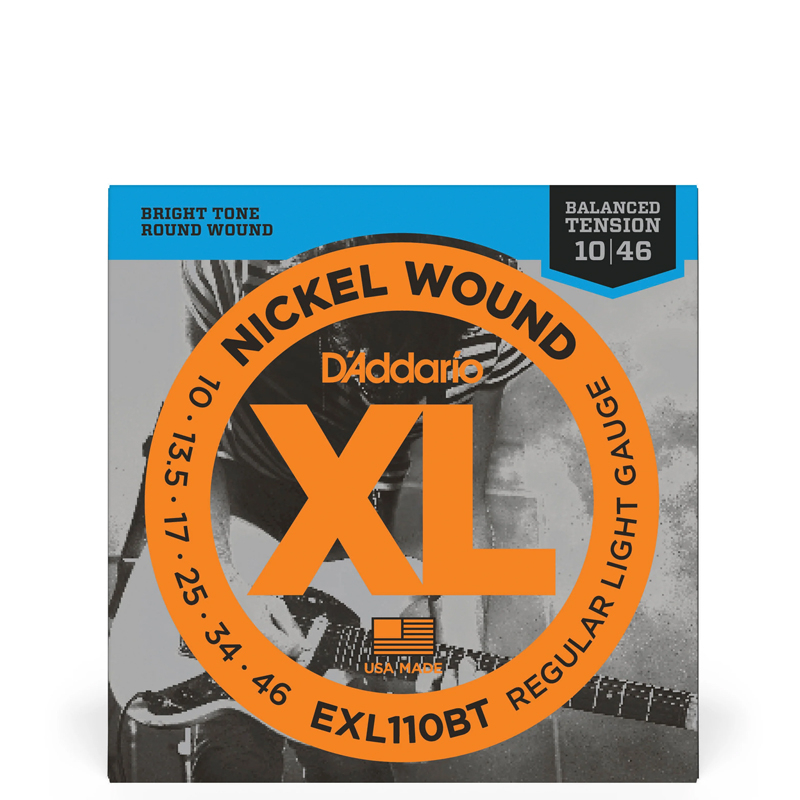
Spec: Nickel wound with hex core, uncoated
+ Different tension options
+ Huge range of materials
- Won’t last as long as coated strings
- Different ranges might confuse new players
D’Addario is Ernie Ball’s only real rival when it comes to electric guitar strings. Offering a similarly massive range of gauges and materials, they have a universal appeal when it comes to tone, suiting a vast array of playing styles.
The XL Range encompasses various types of strings with differing materials. XL Chromes are flat wound for warmth and roundness, while XL Half Rounds sit between Chromes and the XL Nickel Wounds, which are your regular electric guitar strings. XL Pure Nickels deliver vintage tones from the ’50s and ’60s whilst XL ProSteels utilize stainless steel for a brighter tone.
With such a huge range of materials on offer, D’Addario really does have something for everyone, whether you want the vintage blues sound of the XL Pure Nickel, or the round warmth of XL Chromes for your jazz licks.
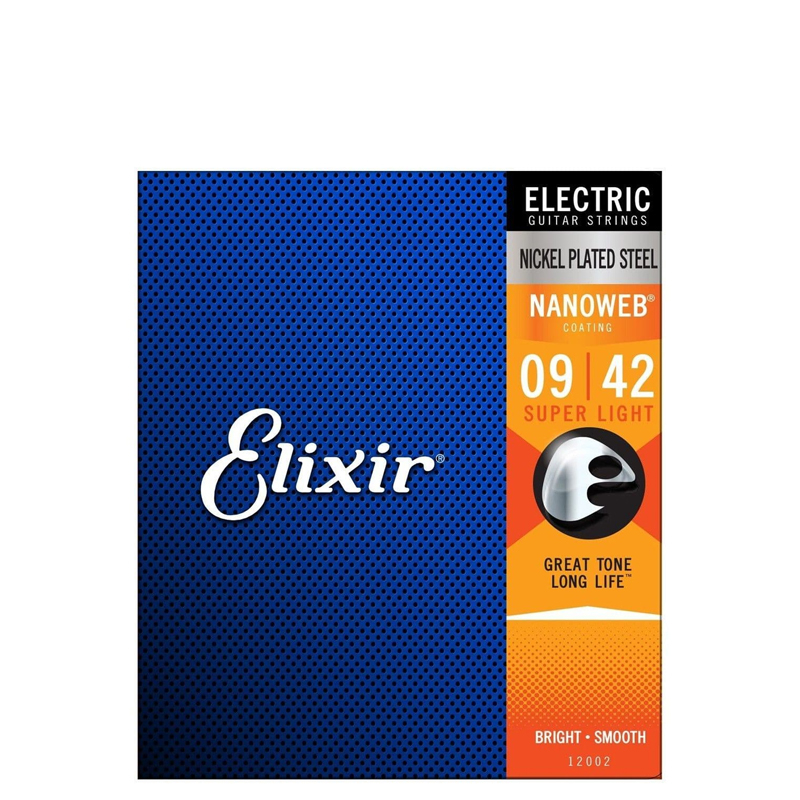
Spec: Nickel plated with steel core, Nanoweb coating
+ Long-lasting performance
+ Ultrafine coating
- Coating eventually flakes off
- Coated feeling not for everyone
Elixir’s Nanoweb offers one of the longest-lasting strings on the market today. The coated feel might not be for everyone, but who doesn’t want a string that holds its tune and stays brighter for longer?
Coated strings have a reputation for losing some of the brightness you get with regular guitar strings. But if you’re not a fan of the new string sound and like yours played in a bit, these strings will sound phenomenally good from the moment you put them on. We’ve noticed that the coating can flake off, which can feel a little unusual, but if you reach this point, it’s about time you treated your axe to a fresh set.
Some players have reported these strings lasting up to six months with regular play, a feat not to be sniffed at. Although they’re on the pricier side of the string spectrum, the fact that you’ll be replacing them less often will more than makeup for the initial outlay.
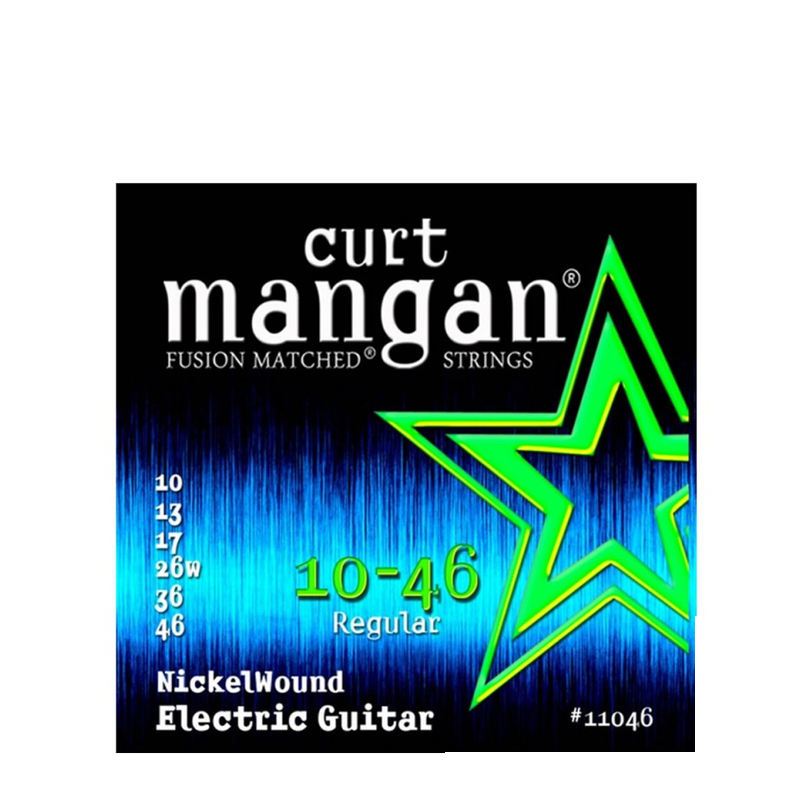
Spec: Nickel plated with hex core, uncoated
+ Articulate and clear sound
+ Create your own custom gauge
- Quite costly
- Not as widely available as others
Despite being a relative newcomer to the string-making game, Curt Mangan actually worked at Ernie Ball for many years, so he knows more than a thing or two about the electric guitar string manufacturing process.
These strings are handmade in the USA to ensure the utmost quality of sound and reliability. You can even specify a custom gauge when you order directly from the Curt Mangan website, a nice touch that sees the pack arriving with your name on it.
These sets are very well-balanced tonally and offer a smooth playing feel that’s instantly comfortable. There are various constructions available too, so you can get the vintage tone of pure nickel sets or the longer-lasting performance of a coated string if that’s what you prefer. As a result of the stiff competition and their relative youthfulness, Curt Mangan strings aren’t as widely available, comparatively speaking, but don’t let this deter you. If you happen to stumble across them, snap a packet up.
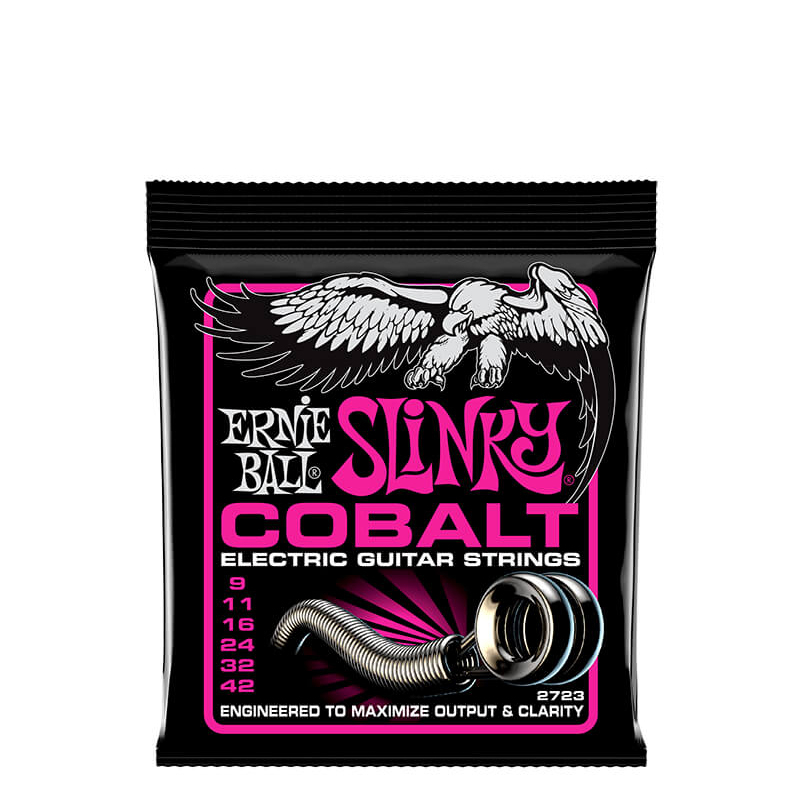
Spec: Cobalt wound with hex core, uncoated
+ Incredible output
+ Excellent dynamic range
- May be too ‘hot’ for some
- On the pricier side
Ernie Ball’s second entry on this list comes in the form of these unusual cobalt-plated strings. Cobalt as an element is around three times more magnetic than nickel, which means that these strings interact differently with your pickups.
Cobalt strings will sound louder than a standard nickel-plated or pure steel string thanks to this unique magnetic relationship. They also have a rougher texture than a regular nickel-plated string, so they're great if you’re the sort of player who really wants to feel their strings.
We also noticed that the cobalt-plated strings feel a lot more pliable than their nickel counterparts, even with similar gauges, so bear that in mind if you utilize string bends often.
The sound is crisp, with great harmonics and increased low-end response. Combine that with the usual Ernie Ball durability, and you’ve got a string with the potential to be a real game-changer.
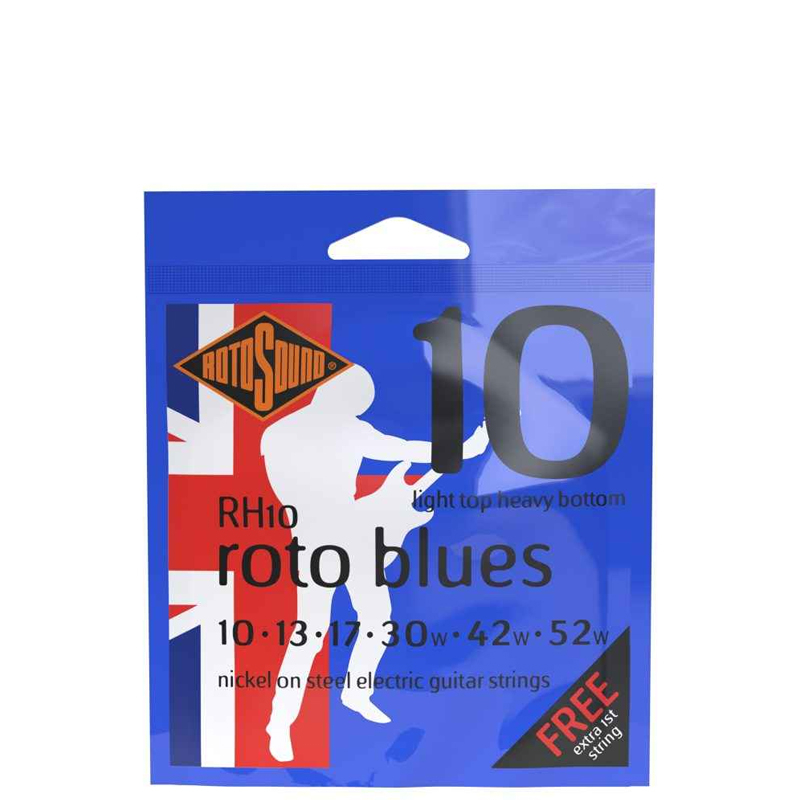
Spec: Nickel-plated with steel core, uncoated
+ Consistent from pack to pack
+ Includes a spare high E
- Not the longest-lasting
- Might be too bright for some
Rotosound is a UK-based brand that was making strings for Jimi Hendrix and The Who back in the heyday of rock’n’roll guitar. Despite this classic rock heritage, its forward-thinking manufacturing processes are more than a match for the modern player, with Guthrie Govan being one of many avid users of the brand.
One of the things players regularly praise about Rotosounds is their consistency from pack to pack. Likely because the company's spent so long making strings, you’ll seldom find a difference from string change to string change, which makes them great when you need reliable sound for regular gigging.
These strings have a bright tonality overall which may have some players reaching for the treble knob. But whether you have single coils or humbuckers, they’ll serve you equally well no matter your set-up or play style.
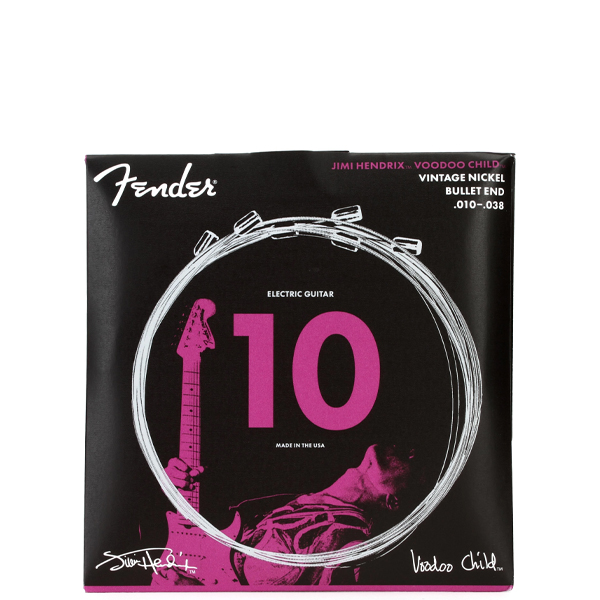
Spec: Hex-shaped steel core, nickel plated
+ Hendrix-style sound
+ Great for string bends
+ Best suited for Fender- May take some getting used to
When people think of Hendrix, they probably think of his wall of amplifiers, his wah-wah pedal, or his upside-down, backwards Strat; they probably don’t think of his strings.
A secret weapon to achieving Hendrix tones is the Fender Hendrix Voodoo Child strings, with Jimi’s own unique combination of gauges.
Rather than a conventional set of string gauges, the E, A, and G strings on Jimi’s guitar were lighter, and the high E, B, and D strings were slightly heavier. The lighter lower strings make this set perfect for heavy string bends that won’t wear your fingers out, while the thicker high strings help you achieve epic sustain, both of which transport you to Jimi’s unique sound.
These sets are, of course, suited best to Strat-style guitars, but other players should consider them too if they’re looking to explore combining different string gauges at the high and low end of their guitar.
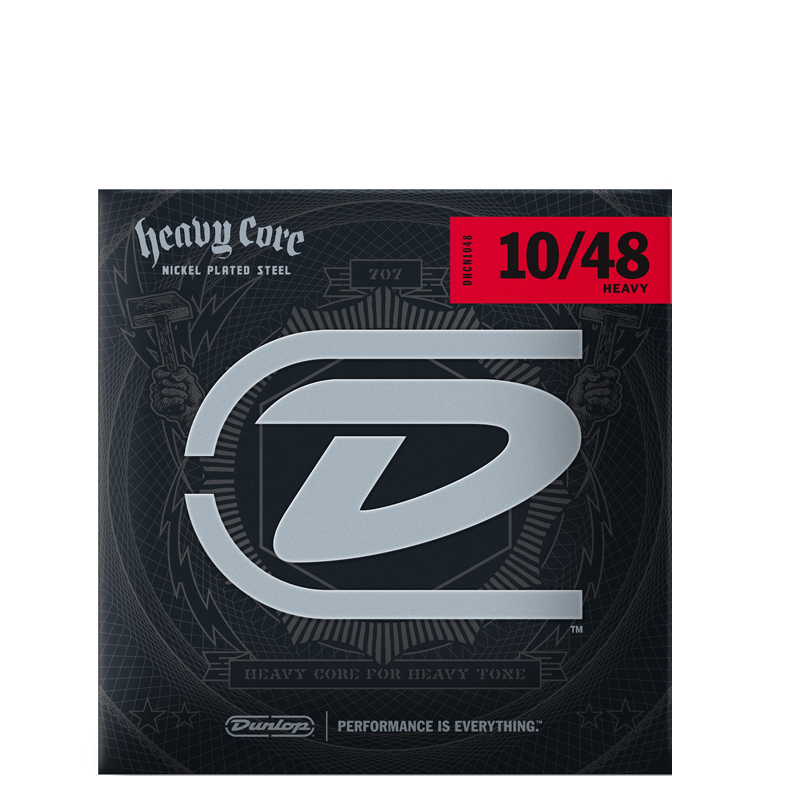
Spec: Nickel-plated steel with hex core, uncoated
+ Great for heavier styles
+ Very durable
- Not for standard tuning
- Might be too thick for some
Let’s face it, Jim Dunlop is primarily known for its outstanding range of guitar care, picks and other accessories, rather than guitar strings. That said, this particular range offers a unique take on something no other manufacturer is doing: gunning for those who like things heavy.
Made in California, Heavy Core strings are designed to be drop-tuned thanks to their core-to-wrap ratio which results in a higher tension. So when you drop tune, you don’t get the dreaded string flop, and instead, they maintain a solid playing feel.
Tight low end is the name of the game here, and these strings do it extremely well. They’re balanced in the mids and smooth in the highs too, sounding great both clean and distorted. If you’re a hard rocker or metalhead, then you’ll find something to love with these.
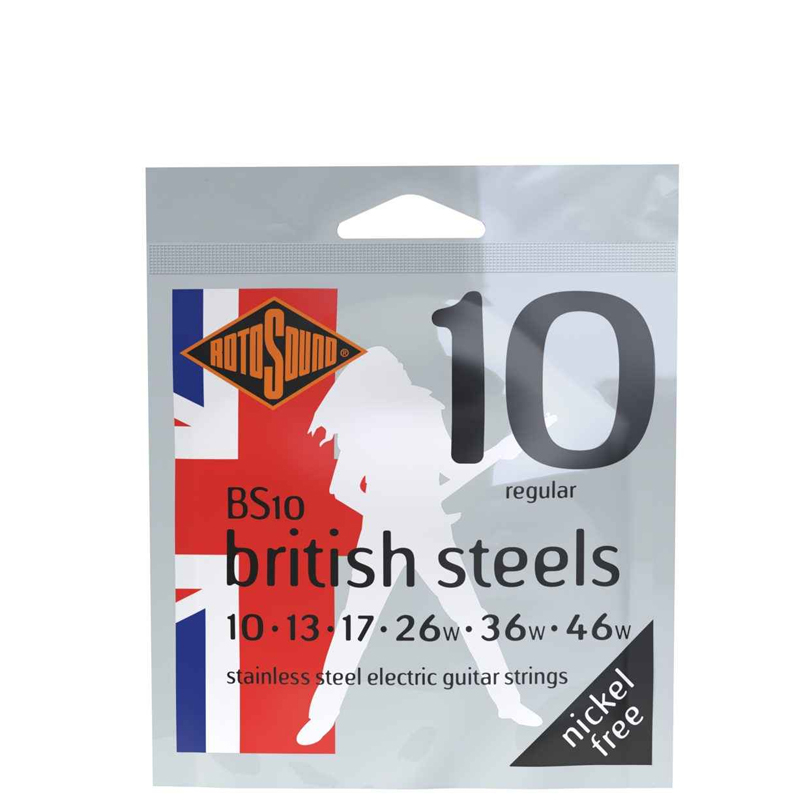
Spec: Steel core with steel roundwound
+ Ideal if you have a nickel or cobalt allergy
+ Incredibly bright attack
+ Proper ‘60s tone
- May be too fierce for some
For those with a nickel or cobalt allergy, the Rotosound British Steels emerge as the best option. Utilizing a stainless steel core and winding, the Rotosounds won’t irritate your fingers like the other options on our list.
Rotosound has been crafting stainless steel strings since the 1960s. In those days, players didn't have the luxury of nickel or cobalt strings; steel was the default choice. Originating during the British Invasion, these strings were used by the likes of Syd Barrett, George Harrison and Pete Townshend and the British Steels perfectly capture the tone of that era. If you’re after the ‘British Sound’ then these are the strings for you.
Distinctly bright, punchy with an increased presence, the Steels aren’t for the faint-hearted. They are also fantastic for country-style finger picking as they have twang in bucket-loads. However, compared to nickel, the steel construction is a bit more sticky on your fingers and we found them to be less smooth.
Best electric guitar strings: Buying advice
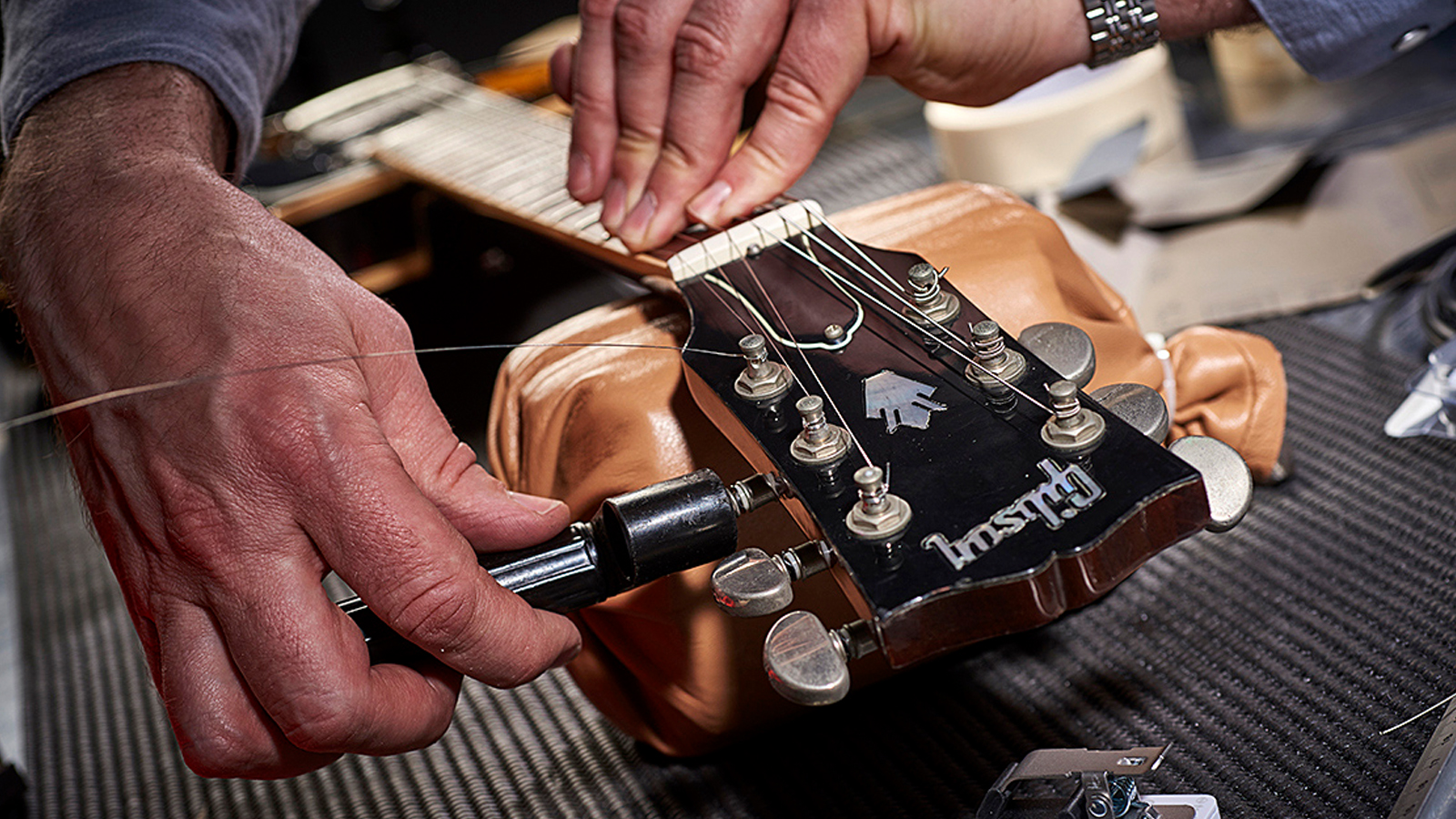
Choosing The Best Electric Guitar Strings
You can trust Guitar Player.
As with everything in the world of electric guitar, string choice is as much about personal preference as anything else; however, there are some manufacturers, such as D’Addario, Ernie Ball, and Rotosound, that have years of experience in string manufacturing, and you can be confident that they’ll be high quality.
While budget strings are available, bear in mind that strings are the fundamental part of playing your guitar, so if you choose low-quality products that don’t sound or feel very good – or worse, break easily – this will drastically impact your ability to get the best out of your instrument. Some budget strings can go for as little as a couple of bucks, so it won’t do any harm experimenting. However, it may be more economical in the long run to buy a slightly more expensive set of strings that aren’t as prone to breakages.
What’s the best string material; nickel, cobalt, or steel?
There are some distinctive tonal and tactile differences between string metals, with no one metal being ‘better’ than the others – unless, of course, you have a nickel or cobalt allergy, in which case we would certainly recommend steel strings!
Nickel is the benchmark in guitar string metals, producing a warm tone that is more mid-focused and slightly more understated in the high end, which produces a more ‘vintage’ tone. Solid nickel strings aren’t as durable as many other strings, as nickel is a softer metal. This means it feels great under your fingers but may wear quicker. This is why nickel-plated strings are often preferred, which combine the sound and feel of nickel with some of the durability of stronger metals.
Steel strings are known for being really bright and favored by those who play genres such as country and rock. This is because steel has high tensile strength, which offers a distinctive snap that is maintained throughout the lifetime of the string; however, it may feel more rigid. Steel also has great sustain and plenty of volume, so players looking to really wail should give them a go.
Stainless steel strings also have the added benefit of corrosion resistance, so if you live in a particularly humid area or get particularly sweaty on stage, you won’t need to worry about your strings suffering as a result.
Cobalt is a particularly magnetic metal – more so than both nickel and steel – which can result in higher output and better signal clarity from your strings. Cobalt strings also have a broad tonal range, with thick and punchy low end and bright, articulate highs. This means they’re really versatile across lots of genres and have the added benefit of also being flexible, which means they’re ideal for players who utilize vibrato or string bends regularly.
Cobalt strings aren’t as common as nickel, so you may be slightly more limited when trying to buy them, and they also often cost more than nickel or steel strings.
Alongside nickel, steel, and cobalt, you can also purchase titanium, chrome, and even copper or bronze strings – though these are very uncommon. Each of these types have unique qualities, but are generally a little more specialist and come at a higher price.
What string gauge should I choose?
There are two factors that should take precedence when choosing the gauge of string you use: tuning and comfort.
Firstly, it is worthwhile explaining what ‘gauge’ means when it comes to strings. Simply put, the gauge of strings is their thickness, with the higher the gauge, the thicker the strings. Gauges are often referred to by their thinnest strings – e.g. '9 gauge' – when casually discussing strings, and this will give an indication of their overall thickness. However, strings should always provide the rest of their string gauges on their pack too.
But why would people want either thicker or thinner strings? Thicker (higher gauge) strings are favored by players who tend to drop-tune their instruments as they will naturally have a lower resonance and you still maintain good tension on the string even when dropping down. This does mean that if you have particularly heavy gauge strings – for example 12 gauge – you may find that standard tuning puts the strings under higher tension, which may not be the most comfortable and could even lead to strings breaking.
Higher gauge strings may not be ideal for those with weaker fingers too as they will typically require a little more effort. Thinner strings can be seen as more suitable for ‘beginners’ – though there are plenty of legendary players who preferred thinner gauge, such as Chuck Berry, as they don’t require as much force from your fingers to press in or bend. The vast majority of guitars will come equipped with either 9 or 10 gauge strings out of the box, as these are versatile.
Are coated or uncoated electric guitar strings better?
Coated electric guitar strings will have a polymer layer on their surface to try and offer additional qualities to strings, particularly improving their durability. The polymer layer means strings are less susceptible to corrosion and wear better under continued abrasion from guitar picks, which means they are often the choice for professionals who play regularly.
As can be expected, adding any kind of additional layer to a string will impact its tone, and coated strings can suffer from a lack of brightness, though this is generally fairly minimal in modern coated strings. The coating also provides a slightly different feel to the strings, which some players enjoy, though it may take a bit of adjustment for those not used to them. Uncoated strings will feel more familiar to most players, which may be the most important thing for you, however, they will typically corrode and wear faster than a comparable coated set of strings – but this may be a worthwhile tradeoff for comfortability and familiarity.
Coated strings will tend to cost more than uncoated counterparts, which may be a deciding factor for some, however their longevity may offset this additional cost. If you aren’t sold on a particular style of string, we recommend giving coated strings a try, as they have little downside and plenty of benefits over uncoated strings.
How we choose products
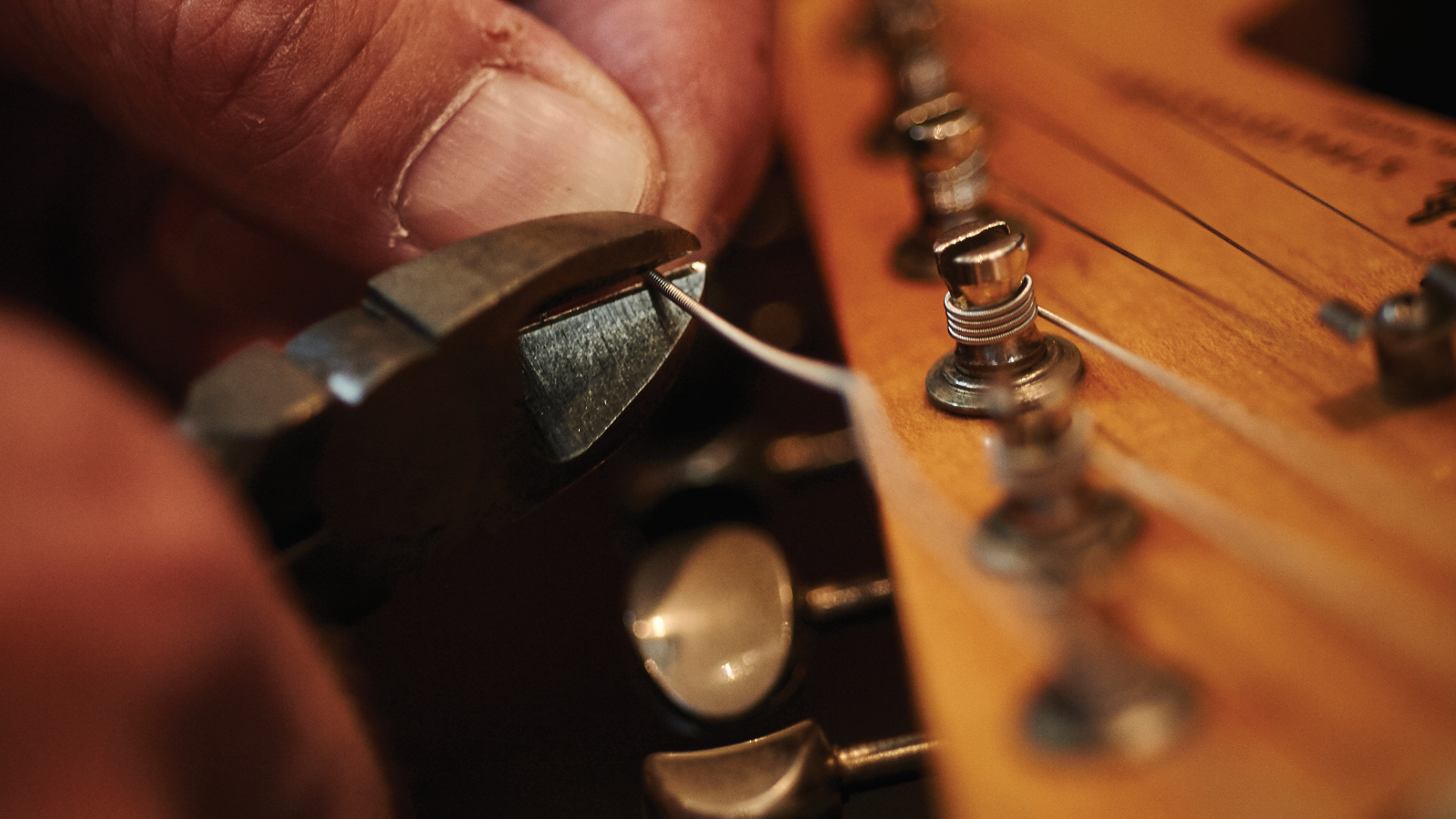
At Guitar Player, our team of writers aren't just music enthusiasts; we're real-life musicians. Our hands-on experience with acoustic guitar amps ensures that our reviews and recommendations are backed by practical knowledge and real-world testing.
When it comes to selecting the best electric guitar strings, we leave no stone unturned. Meticulously evaluating factors like tonal versatility, sonic character, build quality, and value for money, it's only after rigorous testing in a variety of playing scenarios do we choose products for our guides. We stand by our selections, ensuring that every set of strings we recommend is one we'd use ourselves.
Related buyer's guides
- On a budget? Here's our list of the best electrics under $1000
- Plug in with one of the best guitar cables
- The best guitar capos for acoustic and electric guitar
- Unplug with our pick of the best acoustic guitars
- Take a look at the best Martin guitars
Get The Pick Newsletter
All the latest guitar news, interviews, lessons, reviews, deals and more, direct to your inbox!

Matt is a Junior Deals Writer here at Guitar Player. He regularly tests and reviews music gear with a focus on guitars, amps, pedals, modelers, and pretty much anything else guitar-related. Matt worked in music retail for 5 years at Dawsons Music and Northwest Guitars and has written for many music sites including MusicRadar, Guitar World, Guitar.com, Ultimate Guitar, and Thomann’s t.blog. A regularly gigging guitarist with over 20 years of experience playing live, writing, and recording in bands, he's performed everything from jazz to djent, gigging all over the UK in more dingy venues than you can shake a drop-tuned guitar at.
